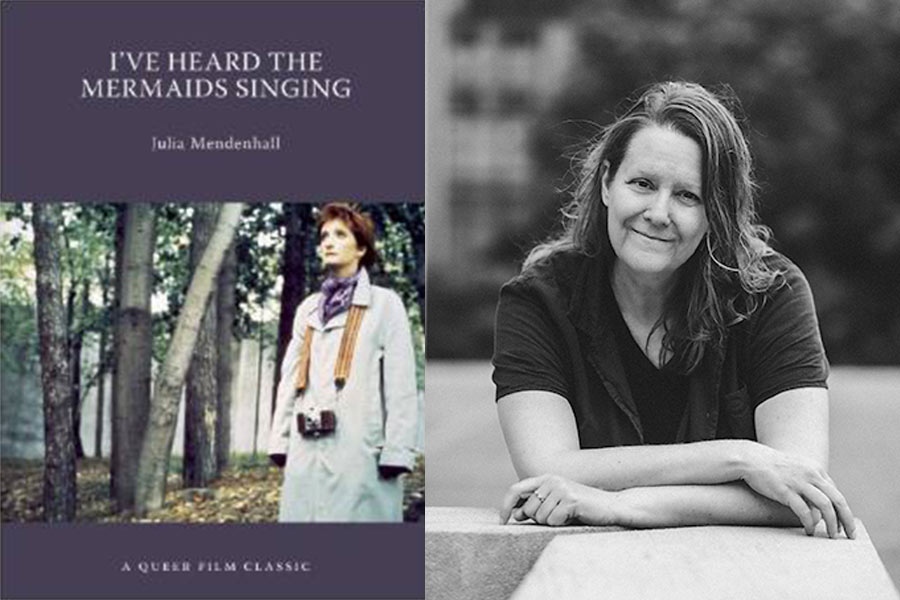Local out film scholar Julia Mendenhall recently published her book “I’ve Heard the Mermaids Singing” as part of the “Queer Film Classic” series published by Arsenal Pulp Press. The author will read from her work at Giovanni’s Room @ Philly AIDS Thrift at 7 p.m. June 18.
Mendenhall’s book unpacks the various meanings and readings of lesbian filmmaker Patricia Rozema’s quirky 1987 comedy. The film features Polly Vandersma (Sheila McCarthy), a self-described “person Friday” and amateur photographer, taking a temporary job at an art gallery run by Gabrielle St. Peres, who is known as The Curator (Paule Baillargeon). Gabrielle has a girlfriend, Mary Joseph (Ann-Marie MacDonald), which creates an unspoken love triangle.
The film was a sleeper hit when it was released theatrically, but Mendenhall admitted in a recent interview that she did not see “I’ve Heard the Mermaids Singing” until 10 years after it was made.
“I was doing my dissertation at Temple University in 1997 on lesbian film and saw it on DVD. I identified with Polly way too much. I over-related to her. I was really shy. I thought the film was super sad, and I didn’t understand it, quite frankly — there was so much going on. I didn’t know what to make of it at first, so I thought, I have to study it!”
Her enthusiasm for the film is boundless, and she admitted with an infectious energy, “I love it even more now. It has all the hallmarks of a great classic. You can read it in a variety of different ways and find different meanings. That’s what makes it a great work of art.”
Mendenhall’s book presents several interpretations of the film. It is accessible to fans of “Mermaids,” as well as those viewers who have not seen the film. The author said that, for her, much of the film’s appeal was how the characters of Polly, The Curator and her girlfriend, Mary Joseph, were very attractive to and reflective of her. “I think the film spoke to the zeitgeist of the time. It’s a very inspirational film. Polly is a quiet, underdog figure, and she is represented in a positive way.”
She added, “Director Patricia Rozema got letters from fans who said the film spoke to them, and that they identified with Polly: a quiet, everyday person.”
“I’ve Heard the Mermaids Singing” was a unique — and, as the author urges, an important — film for LGBT viewers in the late 1980s because it was not a “typical coming-out story.” It was not “Desert Hearts,” a classic lesbian romance from the era. Nor was it “political” like some of the films that heralded what critic B. Ruby Rich dubbed the “New Queer Cinema” around that same time.
“Mermaids,” Mendenhall explained, “is of its own generation, genre and grouping. It didn’t involve big, traditional romance. It was a representation of two women who made art, and it was a critique of the high art world. It was more queer than lesbian.”
This last remark is significant because Rozema, who made the lesbian romance “When Night Is Falling” in 1995, did not want to come out publically when “Mermaids” was released. Mendenhall justifies why in her book.
“Rozema says the film’s characters represents three sides of herself,” the author said. The filmmaker creates ambiguities in her film — such as: Is Polly in love with The Curator? Or is Polly asexual? — that Mendenhall explores in her book. She posits that Polly is polymorphously perverse; she experiences erotic gratification from the body and sensations, and experiences pleasure in looking and making art, as well as hearing the titular mermaids singing.
“Polly is child-like, not childish. It’s a coming-of-age story,” Mendenhall observed. She also credits the director for being innovative in her storyteling, using a direct-to-camera narrative that has Polly providing videotaped confessions, as well as some handheld camerawork.
“Some folks probably think it’s dated,” the author acknowledged, “but people still laugh at it. It’s really a quiet comedy. It has a Canadian sensibility and humor. It’s not our American, scatological over-the-top stuff. The wordplay in the film is corny. There are subtle touches of humor and irony and some laugh-out-loud funny stuff. It’s deadpan comedy. The film respects the audience to get the irony and the jokes.”
When Mendenhall has shown the film in classes she has taught, she effused, “students find it very funny.”
The author will show clips of “Mermaids” at her reading and signing and discuss the film and the various reactions and responses to it.
“Studies in cognitive science indicate that art is healing. ‘I’ve Heard the Mermaids Singing’ is not only about making enjoyment of out art, but it is art itself. So it’s doubly, triply healing,” Mendenhall said, adding, “Polly is a lovable, relatable queer outsider. That’s why ‘Mermaids’ is a classic.”
Julia Mendenhall will present “I Heard the Mermaids Singing” at Giovanni’s Room @ Philly AIDS Thrift, 345 S. 12th St., at 7 p.m. June 18.
